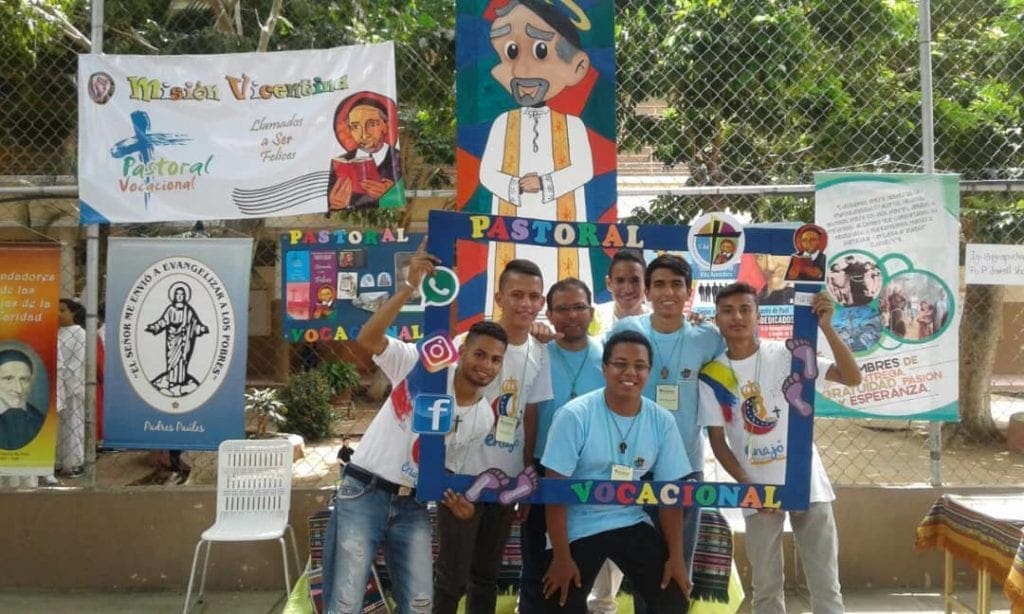As a response to the new situations in which young people find themselves and as an essential element of the missionary endeavor of the Congregation, we feel called to create a vocational culture and to do so from the perspective of our Vincentian charism.
Vocational promotional ministry has to respond to the challenge that results from a lack of personnel as well as to the challenge to direct the life and the ministry of the Congregation toward a creative fidelity in following Jesus Christ, evangelizer of the poor.
What do we mean by a vocational culture?
A vocational culture is a way of understanding the life of the church and, therefore, a way of understanding the life of the Congregation … an understanding of that life in light of the call to engage in the process of the new evangelization. Thus, every missionary and each community is inspired by a series of principles and convictions (mentality) so that each individual interprets his life from the perspective of those principles and convictions (sensitivity) and becomes a lifestyle that gives identity to the whole congregation (praxis).
The Congregation of the Mission has a challenge that flows from its proper mission, the evangelization of the poor. Thus, vocational pastoral ministry is learning the style of Jesus, who passes through the places of daily life, stops without being hurried and, by looking at our brothers with mercy, leads them to encounter God the Father (Pope Francis, Address to Participants in the International Conference on Pastoral Work for Vocation, October 21, 2016).
How do we move toward a vocational culture?
On-going formation is the first element with regard to the creation of a vocational culture. We will be able to create this culture in the Congregation to the degree that the members understand vocational promotion is a ministry that not only involves those who have been specifically designated for that ministry but thatit is up to all of us to ask God to send good workers into his harvest and live so well that we will give them, by our example, an attractive rather than a distaste for working with us (CCD:VIII:342).[1]
The following are some of the means that can help us discover an assertive vocational pedagogy: defining schedules and vocational projects in the light of reality of each province, outlining the necessary qualifications of those responsible for vocational ministry, and accompanying young people in their process of discernment.
In summary, the signs of the time challenge us to make every effort to move toward a Vincentian culture of vocations with the certainty that God is the one who calls us and who, from all eternity, has destined us to be Missioners (CCD:XI:98).
By: Rolando Gutiérrez, CM
Vice-Province of Costa Rica
Translated:
Charles T. Plock, CM
Eastern Province, USA
[1]Vincent de Paul, Correspondence, Conference, Documents, translators: Helen Marie Law, DC (Vol. 1), Marie Poole, DC (Vol. 1-13b), James King, CM (Vol. 1-2), Francis Germovnik, CM (Vol. 1-8, 13a-13b [Latin]), Esther Cavanagh, DC (Vol. 2), Ann Mary Dougherty, DC (Vol. 12); Evelyne Franc, DC (Vol. 13a-13b), Thomas Davitt, CM (Vol. 13a-13b [Latin]), Glennon E. Figge, CM (Vol. 13a-13b [Latin]), John G. Nugent, CM (Vol. 13a-13b [Latin]), Andrew Spellman, CM (Vol. 13a-13b [Latin]); edited: Jacqueline Kilar, DC (Vol. 1-2), Marie Poole, DC (Vol. 2-13b), Julia Denton, DC [editor-in-chief] (Vol. 3-10, 13a-13b), Paule Freeburg, DC (Vol. 3), Mirian Hamway, DC (Vol. 3), Elinor Hartman, DC (Vol. 4-10, 13a-13b), Ellen Van Zandt, DC (Vol. 9-13b), Ann Mary Dougherty (Vol. 11-12); annotated: John W. Carven, CM (Vol. 1-13b); New City Press, Brooklyn and Hyde Park, 1985-2009, vol. VIII, p. 342. Future references to this work will be inserted into the text using the initials [CCD] followed by the volume number, followed by the page number



This is an excellent article that I will use in my vocational ministry as a vocation director. Thanks for sharing a new light and a new bent on vocation culture.
I would like to join this congregation of the mission, I am originally from Zambia and I need total assistance from you formators